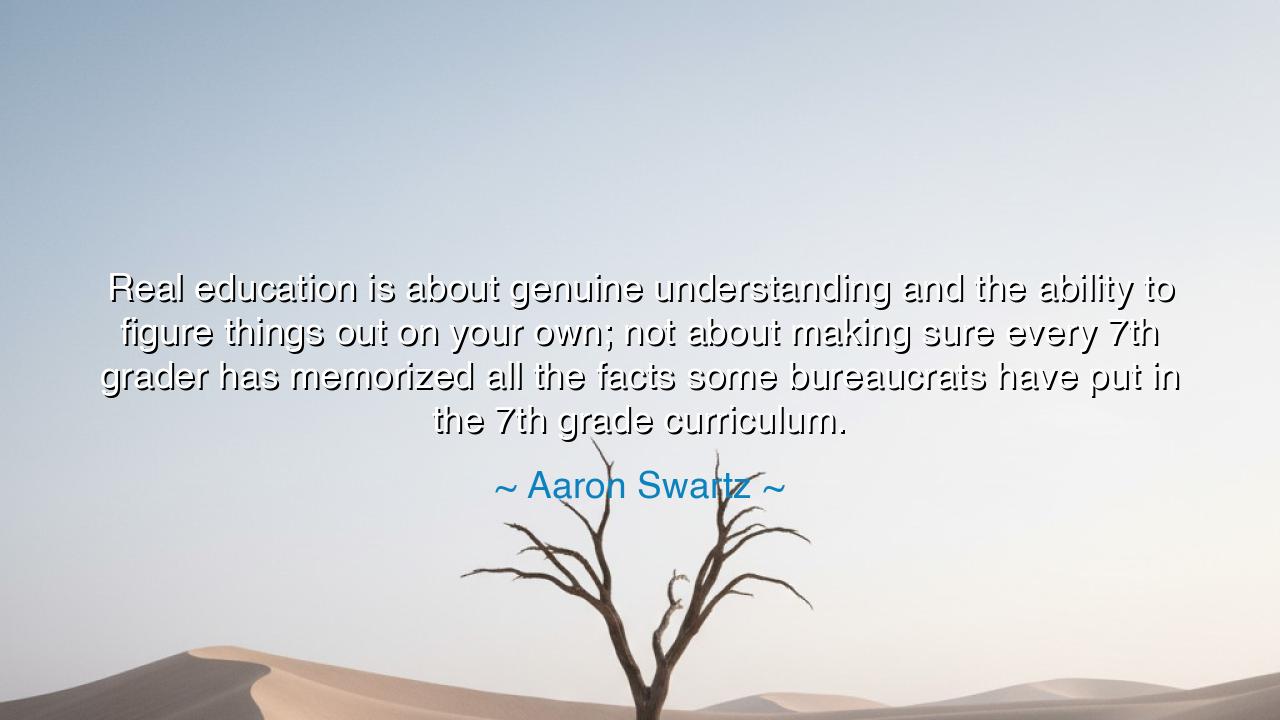
Real education is about genuine understanding and the ability to
Real education is about genuine understanding and the ability to figure things out on your own; not about making sure every 7th grader has memorized all the facts some bureaucrats have put in the 7th grade curriculum.






The young visionary Aaron Swartz, a child of the digital age and a warrior for knowledge, once said: “Real education is about genuine understanding and the ability to figure things out on your own; not about making sure every 7th grader has memorized all the facts some bureaucrats have put in the 7th grade curriculum.” In this truth, spoken with the fire of youth and the clarity of genius, lies a rebuke to the false idols of rote learning. Swartz, who sought to make the world’s knowledge free for all, understood that education is not the mere memorization of facts—it is the liberation of the mind. To be educated, he taught, is not to know what others have written, but to see, to question, and to create from one’s own understanding.
To understand his words, one must know the life from which they were born. Aaron Swartz was no ordinary student of the world; he was a seeker, a thinker, and a builder of bridges between human curiosity and the vast ocean of information. From a young age, he questioned the structures that confined knowledge—schools that graded rather than inspired, systems that rewarded obedience over originality. He co-created the framework of the internet as we know it, contributed to , RSS, and the Creative Commons, and fought for open access to information. His war was not against learning, but against the narrow cages that institutions had built around it. Thus, when he spoke of “real education,” he spoke from the battlefield of his own mind—a mind that refused to be tamed.
Swartz’s message pierces to the heart of what it means to know. True education, he said, is not the memorization of names, dates, or formulas—it is the cultivation of understanding, the awakening of reason, and the courage to think freely. For what good is a man who can recite the laws of science but cannot imagine a better world? What use is a woman who can repeat the words of philosophers yet never dares to ask her own questions? Knowledge without understanding is like a lamp without flame—it may appear whole, but it sheds no light. To be truly educated is to see the patterns beneath the surface, to connect ideas, and to build meaning from experience.
History offers many examples of this truth. Consider the story of Socrates, the ancient philosopher who taught not by lecturing, but by asking questions. He would sit among the youth of Athens and challenge them to think—to examine their beliefs, to define their terms, to confront their contradictions. His method, now called the Socratic method, was not about filling the mind with answers, but about kindling the flame of understanding. And for this, he was condemned—just as Swartz, centuries later, was condemned by a society more comfortable with obedience than with inquiry. Both men believed that education must awaken the power of independent thought, and both suffered for that belief. Yet their legacies endure, because their ideas spoke to the eternal hunger of the human spirit—to know not what we are told, but what we can discover.
Swartz’s quote also strikes against the machinery of modern schooling. He saw how bureaucrats, driven by conformity and efficiency, sought to reduce learning to a system of tests and standards. They measured intelligence by scores, creativity by compliance, and curiosity by silence. But the mind, he knew, cannot be standardized. The child who learns to question, to explore, and to build is far more dangerous to ignorance than the one who can merely repeat. Thus, real education, as Swartz saw it, demands freedom—freedom to fail, to ask, to imagine, and to find one’s own way through the maze of knowledge. It demands that we teach not what to think, but how to think.
In this light, Swartz’s life becomes the ultimate lesson. He was not educated by institutions, but by inquiry; not by rules, but by curiosity. His hunger for understanding led him to challenge the systems that hoarded information behind paywalls and privilege. He believed that the knowledge of humankind belonged to all humankind, and that education, like truth, must be shared freely. His tragic death, brought on by relentless legal persecution, serves as a reminder that societies which fear free minds often destroy their brightest ones. Yet his spirit endures wherever people seek to learn not for grades, but for growth; not for approval, but for truth.
The lesson, then, is both timeless and urgent: Seek understanding, not memorization. Let no system define your mind or limit your curiosity. Whether in school, at work, or in solitude, ask yourself not, “What should I know?” but “What does this mean?” Read deeply, think freely, and question courageously. Teach children not to fear mistakes, but to learn from them; not to obey blindly, but to reason clearly. Education, when true, is the art of liberation—it is the forging of minds that can stand alone, guided by their own thought and effort.
So let the words of Aaron Swartz echo across the generations: “Real education is about genuine understanding and the ability to figure things out on your own.” These are not the words of rebellion, but of redemption—the reminder that knowledge, like freedom, begins within. To be truly educated is to be alive to wonder, to carry light into darkness, and to shape the world through understanding. Let us, then, honor his vision not by memorizing it, but by living it—by becoming thinkers, creators, and seekers in a world that still desperately needs minds unafraid to think for themselves.






AAdministratorAdministrator
Welcome, honored guests. Please leave a comment, we will respond soon